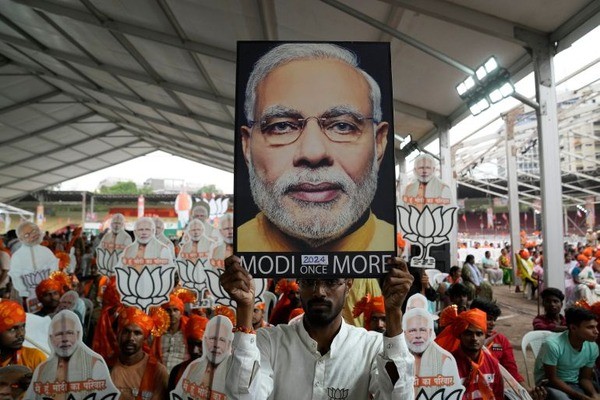Iran’s Plan to Strike Back Against the U.S.
Iran’s Military Preparations Following U.S. Attacks
Loading...

The Central Bureau of Communication, tasked with promoting government initiatives, featured Modi's party slogans in its ads, becoming the leading pre-election spender on Google ads.
In November, as India's election campaign unfolded, Prime Minister Narendra Modi's Bharatiya Janata Party (BJP) introduced the catchphrase "Modi ki guarantee" (Modi's guarantee). Positioned as the personal pledge of the immensely popular prime minister to Indian voters, the BJP aimed to distinguish itself from the diverse coalition of opposition parties. The BJP commenced Google advertisements featuring this tagline in the third week of November.
During the same period, another organization began investing millions of rupees in an almost identical campaign titled "Modi sarkar ki guarantee" (Modi government's guarantee). These videos, which persisted for months, often simply referred to "Modi's guarantee."
In one such advertisement aired on February 23, an actor portraying a young entrepreneur reassured a concerned father about his son's career choice by stating, "Papa, there is Modi's guarantee. Modi ji has promised to make India one of the places with the most unicorn startups." Towards the end, he confidently asserted that "thanks to Modi's guarantee, every startup will begin in India."
Interestingly, these advertisements were not from the BJP; they were funded by the Indian taxpayer and were part of a campaign launched by the Indian government's advertising agency, the Central Bureau of Communication (CBC). At least one other campaign unveiled multiple advertisements in March that echoed the wording and appearance of the BJP's election slogans.
On March 22, the Indian National Congress, the country's largest opposition party, lodged a complaint with the Election Commission of India (ECI), alleging that these CBC advertisements violated election rules by misusing public funds for the governing party's campaign.
An investigation by Al Jazeera reveals the extent of the CBC's spending on government advertisements that appear to mimic the BJP's campaign messages, prompting criticism and raising questions about the ability of non-partisan institutions to ensure a fair electoral environment.
The government's communication agency spent nearly 387 million rupees ($4.65m) on Google advertisements in just under four months, from its regular advertising debut on the online platform in November until March 15, when it last launched an advertisement. India's national elections were officially announced on March 15, after which government agencies are prohibited from running advertisements.
In these 113 days, the CBC emerged as India's largest spender on political advertisements on Google, with the BJP in second place at 314 million rupees ($3.7m). The CBC's spending during this period exceeded that of the primary opposition Congress party, which spent 275 million rupees ($3.3m) in nearly six years, from June 2018 to March 15, 2024, according to Google Ads Transparency data.
Many CBC advertisements were part of campaigns with slogans that independent election transparency activists and the opposition argue were too similar to the BJP's promotional messages.
Opposition parties have long accused the BJP, led by Modi, of politicizing ostensibly neutral government agencies—a claim the BJP refutes. Akshay Marathe, a spokesperson for the Aam Aadmi Party (AAP), part of the opposition INDIA alliance, sees the CBC's controversial ad spending as part of this pattern. Marathe asserts, "Modi ensures that he and he alone will exercise any power in India."
Despite seeking responses from the CBC's leadership, including Dhirendra Ojha, Rajesh Kumar Jha, and Ajay Agrawal, on May 10, Al Jazeera received no reply.
In early March, opposition leader Lalu Prasad Yadav mocked Modi's personal life, prompting BJP members to adopt "Modi ka parivar" (Modi's family) in their social media profiles. Correspondingly, the CBC released ads promoting the "Modi ka parivar" campaign. One such ad, featuring Modi celebrating Diwali with the armed forces, cost about 550 thousand rupees ($6,600) and reached millions.
The Congress complained to the Election Commission, accusing the Modi government of politicizing the armed forces. Before the first phase of India's election, the BJP's manifesto echoed themes and imagery from CBC-funded ads.
While misuse of public funds for self-promotional ads is not new, the CBC's actions have been scrutinized by watchdogs. Vipul Mudgal of Common Cause notes that the current government has taken this to new levels.
In May 2023, the Modi government increased the CBC's budget by 275 percent, allocating 40 percent of ministries' advertising budgets to it, bolstering its resources for the election year.
Congress leader Jairam Ramesh criticized this increase, anticipating the CBC's role in the BJP's 2024 campaign. BJP's Abdulla Kutty defended the budget hike as consistent with India's economic growth.
A rule change in November 2023 allowed the CBC to advertise on digital platforms like Google, leading to a surge in online ad spending, notably promoting the "Modi sarkar ki guarantee" campaign.
The massive increase in online political ad spending underscores regulatory weaknesses in overseeing government ad spending. The surge exposes regulatory gaps, according to experts.
The Supreme Court's 2015 order aimed at curbing political bias in government ads led to the creation of the Committee on Content Regulation of Government Advertisements (CCRGA). However, critics argue that its members, appointed by the government, lack independence.
While the Election Commission oversees campaign rules once elections are announced, opposition parties doubt its impartiality. Quraishi, the former chief election commissioner, notes that the Commission's mandate begins when election dates are announced.
The BJP dismisses claims of electoral bias, pointing to opposition victories in state elections under the same system. Nonetheless, political funding expert Niranjan Sahoo suggests that institutions tasked with accountability tend to perform better under coalition governments, unlike Modi's BJP, which enjoys a significant parliamentary majority.
Iran’s Military Preparations Following U.S. Attacks
Troops remain in five strategic locations, raising fears of renewed tensions and long-term occupation.
Opposition forces have taken control of the capital after a significant offensive. Here is how it unravelled.
